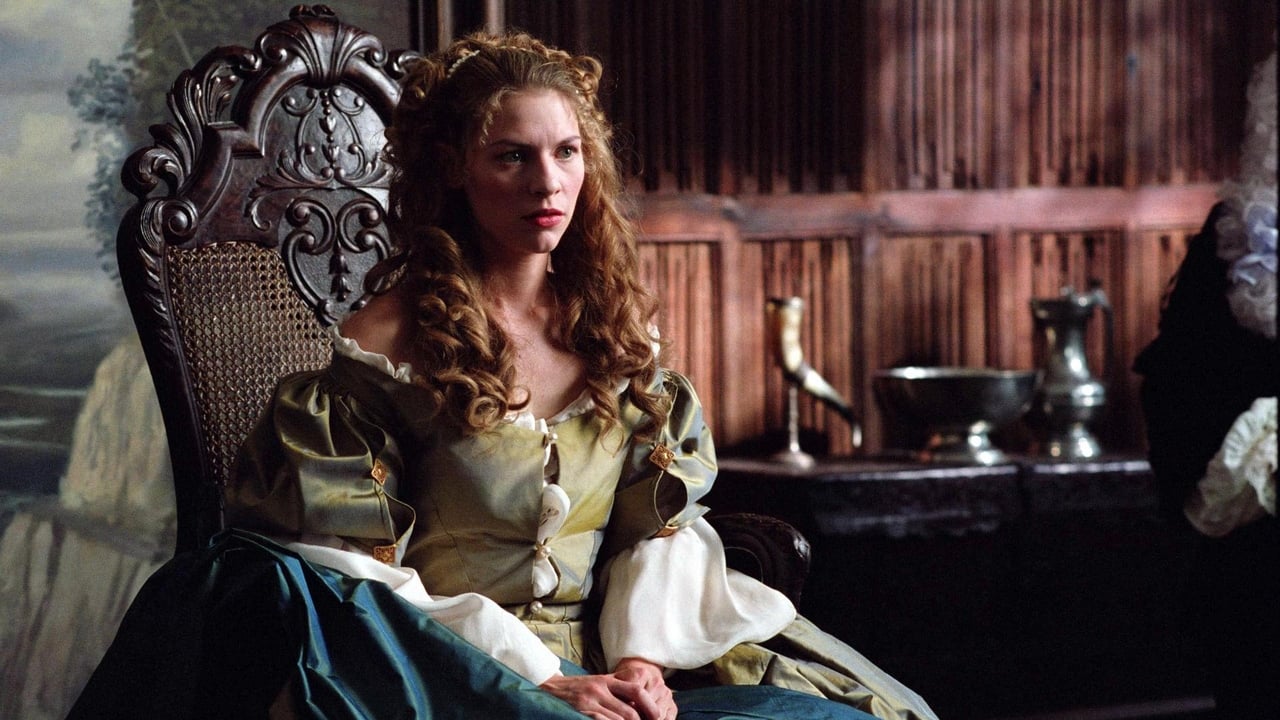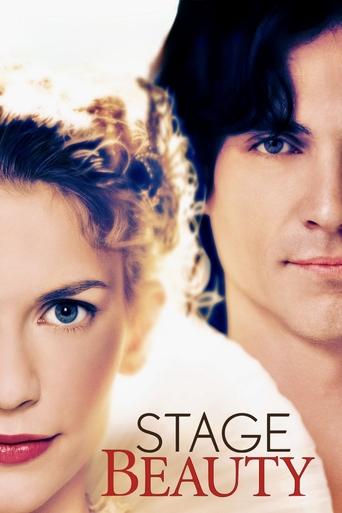

Pretty good movie overall. First half was nothing special but it got better as it went along.
... View MoreThis is a dark and sometimes deeply uncomfortable drama
... View MoreThere is, somehow, an interesting story here, as well as some good acting. There are also some good scenes
... View MoreBlistering performances.
... View MoreStage Beauty (2004) was directed by Richard Eyre. It's set in England in 1660. The monarchy has just been restored, and Charles II is on the throne. (In a clumsy bit of exposition, an actor runs in and says, "The theaters have been closed for 17 years. People want something new!") Of course, what they got is what we now call Restoration comedy. However, they continued to love Shakespeare, and a great Shakespeare performance could still fill theaters.Billy Crudup plays Ned Kynaston, a brilliant male actor who stars in female roles. (We all learned that in Shakespeare's time the female roles were played by men, because women were forbidden to be on the stage. I didn't realize that those laws were still in effect in 1660, but they were.) Ned is really great at what he does. He's been rigidly (cruelly?) schooled to remove every behavior from his repertoire that could be considered masculine. He's a major star. Enter Claire Danes as Maria Hughes, Ned's dresser. She has ambitions to go on the stage as well, and tries to mimic Kynaston's movements and make them her own. She actually performs on an improvised stage in a tavern, and is received very well. She wants to be the first woman to act on the real English stage. As mentioned in the movie, French women had been allowed on the stage by 1660. It's interesting--but not mentioned in the film--that these women were permitted to perform in London. However, they were booed off the stage by the audience. Apparently, the population wasn't quite ready to see women played by women actors. In the film, through a complex interaction at court, involving Nell Gwynn, the king's mistress, women suddenly were allowed to act on the London stage. (Nell Gwynn was indeed the king's mistress, and she was indeed an actor, but not in 1660, when she was only ten years old.)Because of this new ruling, Claire Danes can go on the stage as Desdemona in Othello, and she becomes a star. (A woman did, indeed, play Desdemona in 1660, so that's historically accurate.) Meanwhile, Crudup has been beaten brutally by thugs hired by a vengeful enemy, and he's no longer in demand. So, this is a classic story of theatrical crossed trajectories. (Think about "The Actor.") That's when the movie gets really interesting, and that's where I'll stop talking about the plot.Billy Crudup is superb as Ned Kynaston, Ben Chaplin is excellent as his lover, the Duke of Buckingham, and Hugh Bonneville is wasted in the role of Samuel Pepys, who keeps turning up, but never appears to be in the same film as everyone else.However, the obvious star of Stage Beauty is Claire Danes. Danes was truly charming when she played Juliet at age 17. She was 25 when she acted in this movie, and she got it exactly right. In the film, she's not a very good actor when she starts. It must have been difficult to be a very good actor playing an actor who's not very good. Danes manages it, and more. Crudup's role is more difficult and, to my mind, more central to the film. But what you'll remember is Claire Danes.We saw the film on DVD, and it worked very well. It's an excellent movie, and I highly recommend it.
... View MorePerhaps thought patterns are changing and prejudices against gay characters are indeed abating. At least hearing the audience delight after viewing STAGE BEAUTY makes a case for more mainstream male actors to shed the fear of taking on roles that feature gender and sexuality variations: Russell Crowe, Colin Farrell, Tom Hanks, Matt Damon, Antonio Banderas, Javier Bardem, Rodrigo Santoro, Gael Garcia Bernal, et al have all performed sensitively as gay men despite their macho image - the once small list is now respectably large. And now add Billy Crudup and Ben Chaplin to that ever-growing list. Bravo to that change.STAGE BEAUTY (in the screenplay version of his own play 'The Compleat Female Stage Beauty' by Jeffrey Hatcher) is set in the mid 17th century with all the frills and foibles of British dandies and ladies visually intact. This is the time when female roles were assumed by male actors (the theater was simply no place for ladies to participate) and we are introduced to Mr. Kynaston (in a brilliant, multifaceted performance by Billy Crudup!) as he portrays Desdemona in Shakespeare's 'Othello'. He is attended by a dresser Maria Hughes (Claire Danes, another superlative acting achievement) who longs to act and steals away after performances in the theater run by actor Betterton (Tom Wilkinson) to a tavern where she assumes the memorized roles Kynaston performs on the royally approved stage.Kynaston has been raised to portray women on stage (and indeed in life) and responds to men as a woman (his lover is the Duke of Buckingham - Ben Chaplin). King Charles II (a thorough-going hilarious fling for the gifted Rupert Everett) is convinced by his tart du jour to allow women to play women's roles on the stage, thus dethroning Kynaston as the actress of the time, driving him into tawdry masquerades in pubs after a severe beating from thugs beckoned by the bloated Sir Charles Sedley (Richard Griffiths). Maria Hughes thus becomes the first 'compleat female actress' and this transition between Kynaston and Maria results in desperate tutoring lessons before Maria can play Desdemona for the King. For the first time in his life Kynaston must examine his own sexuality and his successful final curtain after playing Othello to Maria's Desdemona gratefully leaves that choice up in the air.The script is a delight, the actors are all first rate, especially the wholly immersed Crudup and Danes who could well be part of the Royal Shakespeare Company, so fine is their British sound, demeanor, and Shakespeare! The supporting cast is a kaleidoscope of jewel-like performances from Everett, Wilkinson, Edward Fox, Hugh Bonneville among others. The mood is appropriately British - all dark, candlelit stagecraft and foggy marsh vistas - and the music matches the overall picture. Richard Eyre has directed a film that deserves many kudos, but the main glory should shine on his ability to explore the spectrum of gender and sexuality with dignity, intelligence, and tremendous sensitivity. A welcome delight! Grady Harp
... View MoreI watched this movie recently because I like historical dramas, especially those with an English setting. What a surprise to find it so first-rate in every aspect. Why did this film disappear? Why wasn't it nominated for more awards? The plot is fascinating and based on fact (the transition in English theatrical history from men playing women to women playing women); the art direction and costumes wonderful; the cinematography outstanding; and, best of all, the acting superb. The screenplay is also outstanding and takes the film to a deeper level of the examination of identity, gender roles, and relationships between men/women and men/men. Do we act as we are? Are we as we act? Fascinating.Billy Crudup and Claire Danes are a great team, and the scenes between the two of them are compelling and totally engrossing. Richard Griffiths, Tom Wilkinson (what a fine actor he is), Ben Chaplin are all superb, and Rupert Everett cuts quite the over-the-top figure as King Charles. The King Charles spaniels aren't bad, either.Don't miss this superb film.
... View MoreI bought this movie because of Billy Crudup. I always enjoy his performances. But, once the movie started, I was mesmerized. The entire mood and theme of the movie; its looks, its pacing and its story, take us to a time that most of us knew little about.Theatre people, and theatre students knew about this and tittered over love scenes between two men. But, nobody thought about the moment when all that was over and women took to the stage. I venture to say most of us didn't know it wasn't more than socially incorrect for women to be in theatre at one time, but illegal.The story is beautifully written and transcends the issue of women versus men on stage and instead focuses on the acting ability of two such people. King Charles II, in the movie, states that the leading lady (Clare Danes) is the first and Crudup is the last (male to play a female, legally...at least in HIS time.) If you want a lovely view of post-Reformation England, theatre in general, you can see it all here. All this movie leaves out is the horrid smells theatre treated you to. It is that real.
... View More